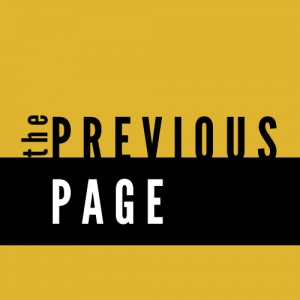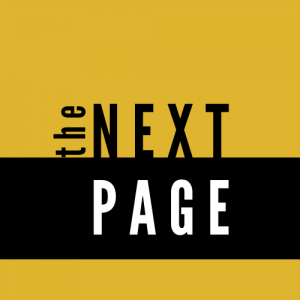Neoliberalism in Philadelphia Neighborhoods
One of the most notable impacts of structural violence caused by neoliberalism is the current controversies over allowing Safe Injection Sites (SIF’s) to exist and operate in the United States and specifically in Philadelphia neighborhoods affected by the opioid epidemic. Controversy exists on many levels, where both legislature and public outcry to the idea of facilitating drug addiction have inhibited nonprofits such as Safehouse from opening in Philadelphia.

It is one thing to classify health under neoliberal frameworks as a commodity that the government should not regulate; it is another to purposefully inhibit nonprofits from attempting to complicate society’s socially constructed notion of health. It is imperative to look at the frameworks (such as the legislature put into effect by those in power) that attempt to argue that those who have been subject to structural violence do not have the right to choose a health behavior that will allow them to live. An ethnographic approach will show that these frameworks directly oppose residents’ narratives and local needs.
Neoliberalism: Binary Approach to Health
Many of these arguments go back to contesting what the idea of “health” is. Neoliberalism pushes for a binary approach to health, where one either makes excellent or poor health choices (notably, these choices are considered completely “independent,” and everyone has the same opportunity of “choice”).
However, the idea of safe injection facilities raises the question of whether “choices” can exist on a continuum and whether those deemed by society to have made “poor” health choices in the past should have the right to make “choices” to improve their standards of health while acknowledging their drug abuse disorder.
The arguments surrounding SIF’s show how opioid or drug addiction cases significantly blur the line between health and life. The following chart aims to outline the different viewpoints and arguments surrounding whether SIF’s should be endorsed or prevented.
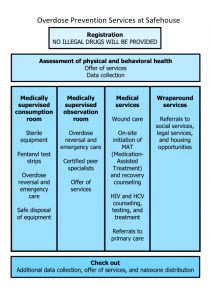
Rather than further criminalizing and punishing those who have a drug addiction (which is facilitated through structural violence), SIF’s aim to mitigate the side effects of drug use that can cost the user their life.
Those anti-SIF’s call them “in-your-face illegal activity” or another “not in my backyard battle.” These protesting phrases are another demonstration of how individuals of power are only concerned with a vulnerable population’s health status when it encroaches on their territory or has the possibility of being an aspect of their narrative (Allyn & Winberg 2020, Lieberman et al. 2020).
Drug to Prison Pipeline in Philadelphia
The drug to prison pipeline came up in conversation when I talked to Linda regarding her daughter and many other individuals who lived in Kensington. Linda believed that the only efficacious treatment for drug abuse is imprisonment due to the continued relapse and rehab patterns that she has seen. She told me:
“What I’m saying is, and this is my feeling, they need to be arrested and put into a mandatory, long term program where they don’t get out of… You know, I know it sounds cold. But you know, I mean, again, like for my daughter’s been in rehab, this is probably her seventh try.
You know, all paid for by, whatever, I’m not even sure who’s paying for it, okay? Um, I have health insurance and if, if that were me, I’d get one shot per year, and that’s it. Okay? And I’m not saying that she should have that, but like, and I just said to her on the phone, like this is seven times. So, what is it, and she’s complaining because they have her on lockdown.
I said, if you were in jail, you would be in lockdown!… Like is that what it takes? Because, I used to pray that they would lock her up and put her in jail. You know? And if you talk to any parent, who has a child, and they think the same thing. Put them in jail! You know? Mandatory. It’s… you’re killing yourself.”
For the past 50 years, those in power have depended on laws put in place from the War on Drugs of the Nixon and Reagan administrations that imprison those with drug violations. The “drug use to prison” pipelines furthers the “out of sight, out of mind” narrative that neoliberalism propagates. Because mandatory minimum sentencing measures exist, why would governmental regulation and assistance to communities experiencing drug abuse be necessary?
Rather than finding an alternative solution that might better serve individuals with drug addictions, our government chooses to utilize a more convenient mechanism that supports their health ideology. These actions show that the ideology of neoliberalism, in deregulating health, opted to imprison those who suffer from drug abuse disorders rather than create government programs to mitigate the structural violence that fosters drug abuse behaviors.
These complex dynamics articulated by Linda add another layer of complexity to the idea of a drug addiction, where society socially constructs health behaviors into criminalizing acts. Obviously, from Linda’s narrative, many drug treatment programs are not efficacious considering the structural violence and the environment that rehabilitated individuals return to. So the question becomes, is it most effective to ensure that individuals have access to treatment or ensure that individuals return to a productive environment that enables their treatment-induced behaviors to continue?
Philadelphia’s ad campaigns aim to dismantle structural violence
While non-profits are approaching these questions surrounding drug addiction with harm reduction strategies, the city of Philadelphia is instead opting for an advertising campaign to share the narrative that addiction treatment is an accessible option that others have successfully made. In this approach, the city is attempting to change the narrative behind what constitutes being “clean” of drugs and what constitutes health by arguing for and making available bupe-assisted treatment.

Philadelphia’s ad campaigns and public service announcements communicate concerns of opioid and heroin addiction; they act to dismantle some of the structural violence that led to the epidemic’s modern-day fruition. The city is starting a conversation about what defines a drug addiction and how many treatment centers define addiction for their patients. The city’s support for medically-assisted drug treatment is in opposition to society’s view that a productive individual is drug-free.
Society’s viewpoint has also permeated Philadelphia’s community, as both rehabilitation centers and individuals with drug addictions believe that they are swapping out a heroin addiction for another addiction: this time to a low-grade opioid. As Feldman (2018) details, many rehabilitation facilities for drug addictions do not support the use of lower-risk opioids as medically-assisted treatment; this has caused me to question whether our societal notions of what “treatment” is and is not may further inflict violence on individuals with drug abuse disorders?
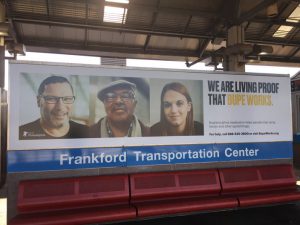
The lack of acceptance of bupe as a reputable treatment for drug abuse disorders may be why many Kensington residents, like Linda, believe that jail is the answer to cure drug addiction. As these ads attempt to display, perhaps our society discredits the solution without giving it a fair chance because the solution does not align with our socially constructed notions of health. Many medical professionals in support of medically assisted drug abuse treatment support these explanations; “Dr. Nora Volkow, who heads the National Institute on Drug Abuse, says that if society more often considered addiction a disease, keeping people off treatment would seem crazy.
‘I don’t see any other condition or disease,’ she says, ‘where you basically ask the person to forego the medication treatment,’ as a condition for getting help.” (qtd in Feldman 2018).
COVID19 vaccination emphasizes our society’s neoliberal health ideology
Another act of neoliberal health ideology impacting Philadelphia and the United States’ entirety is the COVID19 vaccine roll-out. Neoliberalism is acting in broad daylight in the COVID19 pandemic: on December 23, 2020, the United States government purchased an additional 100 million doses of the Pfizer COVID19 vaccine for its constituents (Trump Administration to Purchase Additional 100 Million Pfizer Vaccine Doses – CNN, n.d.).
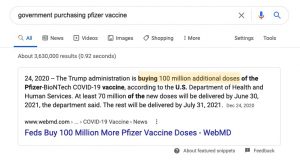
While to most this is seen as stellar news, the wording of these major announcements provides insight into how the pharmaceutical industry actively promotes neoliberal mindsets to ensure that health is seen as a commodity in our society; I believe that it is important to think about the difference between the government “funding” the production of a vaccine versus “purchasing” a vaccine from a pharmaceutical company.
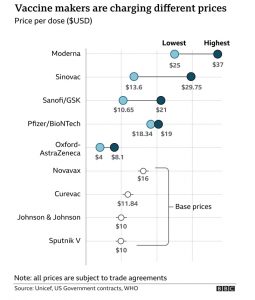
Additionally, our society should question why, in an “unprecedented” pandemic, one pharmaceutical company has the right to profit and additionally not share the “recipe for success” to help ensure the health of the population. Our societal values of capitalism and patents enable price gouging for medication; these factors coupled with drug production monopolies ensure that drugs are produced to make a profit, not to improve health. I argue that passively accepting these market standards, of allowing profits to be more imperative than ensuring that the population has access to the vaccine as quickly as possible, actively contributes to maintaining structural violence in our society.

